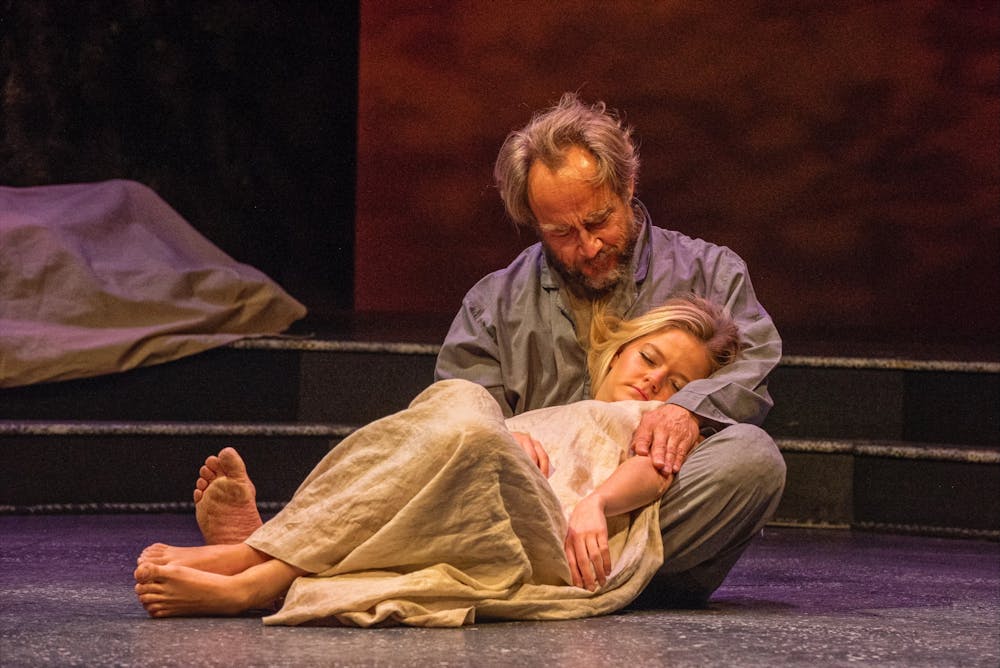From Nov. 14 – 16, the Middlebury community enjoyed a dazzling production of one of Shakespeare’s greatest tragedies, King Lear. Enthralling visual effects and costume design, original musical innovations, and a dynamic cast breathed contemporary life into this timeless classic, leaving audiences in rapt awe.
King Lear, played by Professor of Theater Alex Draper, embodied a dramatic untangling of a strong but deeply flawed personality. From the beginning, Lear is a well-intentioned man lacking balance. In the infamous scene where his youngest and favorite daughter Cordelia, played by Patrice Cahill ’25.5, refuses to shower him with effusive proclamations of love, he casts her away with no possessions. The audience then witnesses Lear’s descent into madness as his power drains away and into the hands of his other two daughters, Goneril and Regan, played by Hannah Alberti ’26 and Elsa Marrian ’25, who take advantage of his old age and their newfound inheritances to gradually but resolutely usurp him.
In this new adaptation by Associate Professor of Theatre Michole Biancosino, music becomes an important added dimension and an inspired production design invites a certain charm. The incorporation of live musical transitions between scenes and actors singing original compositions on stage helped the audience feel more immediately connected to the energies of different characters.
Conscientious thought and careful collaboration also went into the costume design. Visiting Assistant Professor of Theater Summer Jack, who was in charge of the show’s costume design, took inspiration from red carpet aesthetics like high fashion imagery and runway shows.
“The beauty of costume design is you have about 30 seconds when each actor walks on stage and presents their personality before they even say a line,” Jack said in an interview with The Campus. “The innovative side for our version of King Lear is that it’s not medieval, but very contemporary. I think it’s much more exciting this way as the audience can see themselves on stage dressed in a similar way.”
Many of the elaborate costumes were sewed from scratch by students who work for the costume shop, carefully tailored to each actor and intentionally distressed where needed. “It is a lot about searching the world for the right pair of shoes,” Jack said.
Yet, the most striking part of watching the play was the dynamic and talented cast. Everyone embodied their role convincingly while maintaining strong relational energies with one another and at times, directly addressing the audience.
Thomas Long ’25, who played Edmund, the play’s main antagonist, shared his experience working on the production with The Campus.
“Playing Edmund felt like playing several different characters. When he’s around noble and pompous figures like the knights, I try to look very presentational and put together. Towards the end of the show when he’s getting what he wants, he lets go of that uprightness a little bit. That’s where I try to channel a more feral and intense and animalistic energy, ” he said.
Karina Lea ’27, who played one of the knights, shared her evolving relationship with the elusive language of the script.
“Shakespeare’s language requires movement through space to be conveyed properly. The first three times I read King Lear, I was very confused. It gets a lot easier to understand when you’re up (on stage) walking around as opposed to sitting and looking at the huge chunks of text,” Lea said.
Professor Draper provided helpful suggestions to the cast regarding the script, such as adding a line to provide more clarity.
The cast’s lively performances were audibly well-received by the audience. Outbursts of applause and laughter were heard throughout the two-hour long production. Graydon Hanson ’25, the assistant backstage manager, acknowledged this heartening aspect of theater in an interview with The Campus.
“One audience laughs at something and another doesn’t. It’s fun to see how the different performances can evolve and grow depending on the mood of the day.”
It is grueling work to get a play ready, and a lot of it goes unnoticed backstage. A play’s immersiveness thrives on immaculate lighting, sounds, blocking and seamless transition between constructed spaces, which this production succeeded in achieving, thanks to everyone on and off stage.
In the tragic ending of the play in which all three sisters perish and King Lear dies of heartbreak, Shakespeare leaves us exhausted, saddened and wondering poignantly: "Is this the promis'd end?" The play is surely more than a comment on senility or sibling rivalry, or even duplicity and greed. It reminds us that life is very hard and uncertain, that one can never fully plan for all eventualities and that there is no substitute for moral rectitude, wisdom, understanding and patience.




